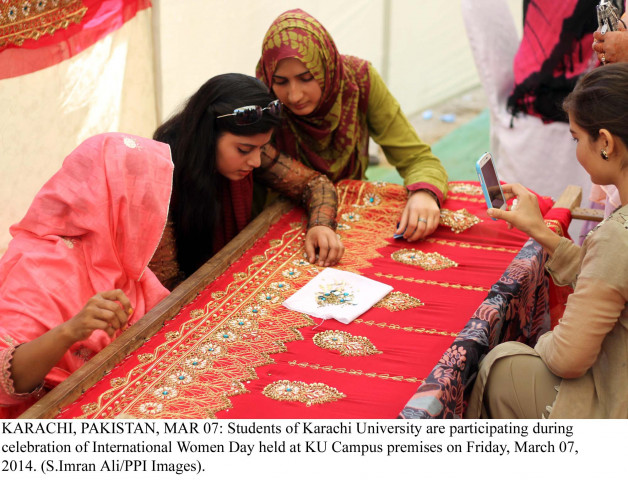Informal sector: Home-based workers to get legal rights next week
Punjab Home Based Workers Bill to be presented in provincial assembly.

The Punjab Home Based Workers Bill will be introduced in the provincial assembly next week, Labour Department Director Syed Hasnat Javed said on Saturday.
He was speaking with parliamentarians and members of district action committees at a consultation arranged by HomeNet Pakistan. Participants discussed policy recommendations vis-à-vis home-based workers.
Javed said, “We have begun registering home-based workers across the Punjab... initially 10,000 home-based workers in the province will be registered.”
“At present, there are no laws in the country or abroad that recognise home-based workers as labour... we are burning midnight oil to ensure their rights,” he said.
Javed said the Punjab Home Based Workers Bill had been drawn up based on recommendations from parliamentarians and other stakeholders.

He said the Bill would present a definition of the middleman and a procedure to ascertain wages of home-based workers. “We have tried to incorporate conventions of the International Labour Organisation and several clauses of international human rights laws,” he said.
Parliamentary Commission on Status of Women chairperson Fauzia Viqar said that she had met with home-based workers, most of them women, and heard their problems. She appreciated the Labour Department’s commitment to consider the problems faced by home-based workers and taking the initiative to accord them legal recognition as workers.
“The PCSW is committed to addressing issues faced by women home-based workers and is working hard to address their issues at the earliest.”
Viqar said the PCSW had the powers of civil courts in cases of misuse of power by state machinery against women in the Punjab.
“If a woman has a grievance and the police are not entertaining her complaint, she should inform the commission... we will get a case registered for her,” Viqar said. “We also have a toll-free helpline for women. Women home-based workers are welcome to use it.”
Viqar urged home-based workers to benefit from the Punjab Skill Development Fund. “It will not only help them financially, but also enhance their skill set.”
She said the workers could also enrol in trainings organised by the TEVTA.
HomeNet Pakistan executive director Ume Laila said the Home Based Workers Day was observed in South Asia each year on October 20. She said civil society organisations had been working for the uplift of home-based workers in South Asia since 2005. “We urge the government to recognise the Home-Based Workers’ Day and observe it at a national level.”
Laila said the law [which will be presented for passage in the Assembly next week] had been drafted in 2012 but the Law Department had reservations on it and it was sent to the Labour Department. “Now finally, those reservations have been addressed and the Bill is ready to be presented on the floor of the Assembly.” Once it becomes an Act, home-based workers will be recognised as labourers and will be entitled to social security and the right to association.
MPA Ayesha Javed said home-based workers and DACs worked hard for a living and should be appreciated for that. “We are here to interact with you and listen and address your problems.” She asked the Labour Department to share the draft law with parliamentarians before it was introduced in the Assembly so they could debate it in a more nuanced way. MPA Saadia Sohail of Pakistan Tehreek-i-Insaf appreciated the HomeNet Pakistan’s efforts and urged the government in Khyber Pakhtunkhwa to take up the issue of home-based workers as well.
She said, “We need to remove the role of middlemen entirely in order to empower home-based workers.”
Provincial governments must stop making tall claims and get down to work. “They could start with working for the financial and social uplift of home-based workers,”
Dr Zarqa Taimoor, president of the PTI’s women’s wing, said, “We need to take up the issue in the media as well.”
She urged home-based workers to organise protests and rallies to press their rights. She said lawmakers must support the Bill when it is presented in the house next week.
She said, “We need to adopt a policy and law for the betterment of home-based workers on war footing... for that we need the support of parliamentarians.”
Rubina Sheikh, a home-based worker from Jhang, said home-based workers had learned a lot from DACs regarding their rights.
“When one of our fellow home-based workers lost her life in the recent devastating floods, we convinced the local administration to help her... and when Chief Minister Shahbaz Sharif visited Jhang, he gave her family a cheque for Rs1.6 million.”
Published in The Express Tribune, October 19th, 2014.



















COMMENTS
Comments are moderated and generally will be posted if they are on-topic and not abusive.
For more information, please see our Comments FAQ